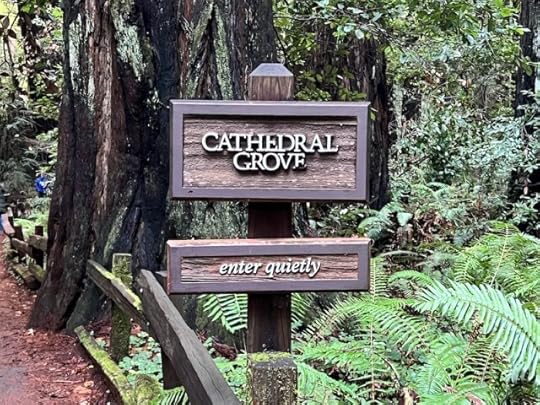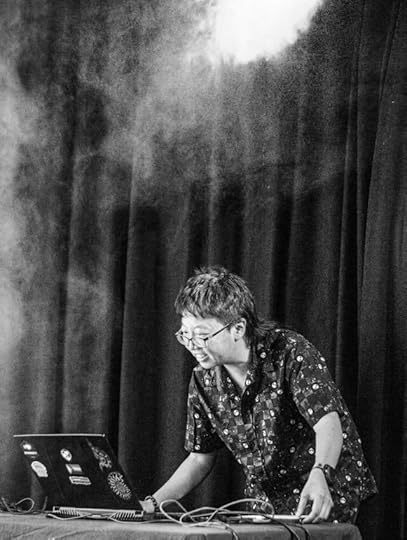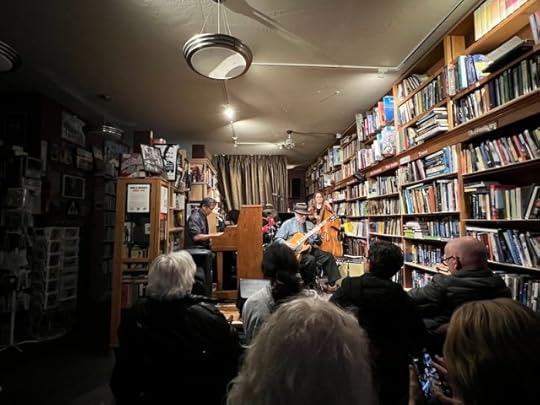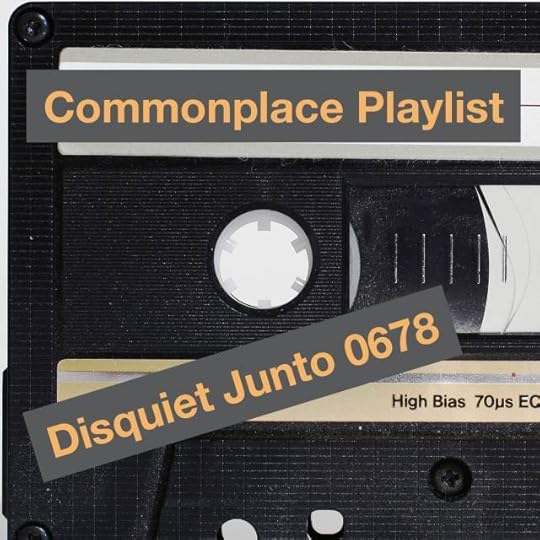Marc Weidenbaum's Blog, page 35
January 2, 2025
Disquiet Junto Project 0679: Ice Age

Each Thursday in the Disquiet Junto music community, a new compositional challenge is set before the group’s members, who then have five days to record and upload a track in response to the project instructions.
Membership in the Junto is open: just join and participate. (A SoundCloud account is helpful but not required.) There’s no pressure to do every project. The Junto is weekly so that you know it’s there, every Thursday through Monday, when your time and interest align.
Tracks are added to the SoundCloud playlist for the duration of the project. Additional (non-SoundCloud) tracks also generally appear in the lllllll.co discussion thread.
Disquiet Junto Project 0679: Ice Age
The Assignment: Record the sound of ice in a glass and make something with it.
Welcome to a new year of Disquiet Junto communal music projects. This week’s project is as follows. It’s the same project we’ve begun each year with since the very first Junto project, way back in January 2012. The project is, per tradition, just this one step:
Step 1: Please record the sound of an ice cube rattling in a glass, and make something of it.
Background: Longtime participants in, and observers of, the Disquiet Junto series will recognize this single-sentence assignment — “Please record the sound of an ice cube rattling in a glass, and make something of it” — as the very first Disquiet Junto project, the same one that launched the series back on the first Thursday of January 2012. Revisiting it at the start of each January ever since has provided a fitting way to begin the new year. By now, it qualifies as a tradition. A weekly project series can come to overemphasize novelty, and it’s helpful to revisit old projects as much as it is to engage with new ones. Also, by its very nature, the Disquiet Junto suggests itself as a fast pace: a four-day production window, a regular if not weekly habit. It can be beneficial to step back and see things from a longer perspective.
Tasks Upon Completion:
Label: Include “disquiet0679” (no spaces/quotes) in the name of your track.
Upload: Post your track to a public account (SoundCloud preferred but by no means required). It’s best to focus on one track, but if you post more than one, clarify which is the “main” rendition.
Share: Post your track and a description/explanation at https://llllllll.co/t/disquiet-junto-project-0679-ice-age/
Discuss: Listen to and comment on the other tracks.
Additional Details:
Length: The length is up to you.
Deadline: Monday, January 6, 2024, 11:59pm (that is: just before midnight) wherever you are.
About: https://disquiet.com/junto/
Newsletter: https://juntoletter.disquiet.com/
License: It’s preferred (but not required) to set your track as downloadable and allowing for attributed remixing (i.e., an attribution Creative Commons license).
Please Include When Posting Your Track:
More on the 679th weekly Disquiet Junto project, Ice Age — The Assignment: Record the sound of ice in a glass and make something with it — at https://disquiet.com/0679/
January 1, 2025
2025: Enter Quietly

On the last day of 2024, I found myself again in Muir Woods, again in the mode of “Marc walks into nature and takes pictures of signs.” Not until I was back in the car did I recognize that I had found the right way — essentially an oblique strategy, courtesy of the National Park Service — to approach 2025. There’s a useful ambiguity to the typeface, the italics a tool of emphasis, despite what they’re emphasizing being an effort at self-constraint.
December 31, 2024
Junto Profile: W. Sze Tsang (aka Samarobryn)
This Junto Profile is part of an ongoing series of short Q&As that provide some background on various individuals who participate regularly in the online Disquiet Junto music community.
What’s your name? My full name is Wing Sze Tsang. In my artist practitioner-researcher life, I use W. Sze Tsang. In the majority of face-to-face interactions, I use Sze (pronounced like ‘sea’, I usually tell people to think of the ocean). When I’m ordering food or coffee from a shop, I use Wing because people will mishear ‘Sze’ and turn it into a variety of different names.
samarobryn is my moniker for my solo music projects. ‘samarobryn’ comes from a Nostradamus quatrain:
Samarobryn, a hundred leagues from the hemisphere,
Shall live without law, exempt from policy.
I chose ‘samarobryn’ because I was really drawn to this image of a strange, watchful, distant cryptid — as a fellow strange, watchful cryptid, I can totally relate to the experience of observing the world from afar.
I’m currently in two bands: Veils is an experimental, instrumental band combining vocals, guitar, modular synths, laptop and live visuals. Phantom Island is a thumping, new-wave tinged rock band featuring a bunch of local legends.

Where are you located? I was raised in, and currently live, work and play in Boorloo [Perth], on Whadjuk Noongar Boodja, part of the Noongar Nation [South-Western Australia]. My ancestral roots are in Hong Kong, where I spent the first two years of my life. I’ve travelled a lot over the years, but Boorloo is my home.
I currently live in the outer northern suburbs, with the beach in the west and a national park behind. I generally enjoy living here, although it can feel isolating because I’m far away from the city’s cultural hotspots. Living in Boorloo itself can also be quite isolating, as we are so far from the rest of Australia and the world, but we have an active, close-knit arts scene where everyone is so supportive of each other. I also think the isolation has given me the space to approach my music in novel ways.
What is your musical activity? At its core, my work is about exploring how I feel about something — and this something can be a theme, a place, or an idea. I list a few keywords that summarise my feelings, then I ask myself — how might I express these feelings through sound? I’m really interested in the intersections between history, place and self, and this interest ultimately led me to completing a PhD in Music Composition in 2023, via the Western Australian Academy of Performing Arts at Edith Cowan University.
The main foundation for my works are field recordings, for two reasons. Firstly, it’s a way of incorporating place into my works as a way of self-reflexive narrative. It’s interesting to explore what drove me a) to go to a place and record and b) why did I choose to record a certain sound? Secondly, using field recordings is a way of exploring how I could use existing sounds in a new way. I use a lot of audio manipulation in my works — delays, time-stretching, distortion, phasers, reverbs — because it’s fascinating how these tools can dramatically alter the character of a sound.
Time-stretching is one of my favourite techniques, particularly extreme time-stretching. I first came across the idea via English composer Joanna Baillie, who would do extensive elongations on small moments in time. She termed this process as, ‘freezing’, and it’s about exploring all the hidden rhythms and melodies of an instant, and allowing these events to become accessible to memory. In a similar vein, Canadian composer Barry Truax also uses elongation as a way to dive into the inner, hidden harmonics of a sound.
A lot of my work tends to be quite aurally dense — full of drones and sounds asynchronously layered, alongside unaltered field recordings. Much of my work is based around deep dives into a single field recording — taking moments of varying lengths, elongating and manipulating them, having them pan and weave around each other. It’s also quite exciting because I can never predict the final result.
I’d say my current practice started to coalesce around 2017. For about three years prior, I had been exploring how to translate my landscape photography to sound. The work I created had a bit of field recording, but it was largely sonification (aka the process of translating non-musical data into musical data) and beat and notes-based.
In terms of music in general — the very first instrument I learnt was the piano. I did classical piano until I was 16, until I discovered the cathartic power of smashing out distorted power chords on guitar. While I don’t directly employ my classical training in my current music, I find that it’s been a great foundation for structuring compositions and working out melody lines when I’m playing guitar. Speaking of which — the guitar has taken me to some interesting and unexpected places. I’ve been part of lots of local bands over the years, and also played guitar in a dance show (Cry Baby) and a theatre show (The Dirty Mother). It would’ve blown my angsty teen self away.
What is one good musical habit? I think it’s always good to ask yourself, “What am I trying to convey with this song/piece/sound?” Then always circle back to your original rationale with anything you do while in the midst of your work. Think about whether this technique/piece of equipment/instrument etc. will help you achieve your goal. Sometimes people get caught up in wanting to, or feeling like they need to, use something that’s new to them, simply because it’s there — and not because it’ll actually enhance the final work.
That’s not to say you shouldn’t experiment — on the contrary, experimentation is where you get some of the best ideas! — but it’s a) okay to try something and abandon the idea because it’s not the right moment and b) always think back to whether something is going to help you create your work’s narrative.
What are your online locations? If you want to find out more about my work and research, my website is a great place to start. Contains links to everything!: samarobryn.work/
I post about my latest updates and works-in-progress on my Instagram: instagram.com/samarobryn/
For my bands, you can check them out here:
Veils: instagram.com/veils.collective/
Phantom Island: instagram.com/phantomislandband/
What was a particularly meaningful Junto project? I first started joining the Junto in 2018, as a way to overcome my then writer’s block — so there’s quite the back catalogue! After some thought, I finally settled onto this one from December 2020 — [distant screaming], from Disquiet 0469.
2020 was a difficult and tumultuous year for me — it marked the advent of the pandemic where I was an essential worker as frontline hospital staff. I also dealt with lots of personal losses, and the cherry on top of this hellscape was dealing with a toxic workplace that sent my mental health into the shitter. It was very healing to record myself screaming and getting the frustrations of the year out of my system.
What characteristics does your music have today that it didn’t before you studied for and received your PhD? Good question! Sound-wise, I’d say the main characteristic is the emphasis of field recordings as the basis for creating work. Before my PhD, it was there in the background as a supporting element, while I was more interested in thinking how to convey data from photographs I’d taken in the field (in the form of HEX and histogram values) into sound. I had that interest because I was into landscape photography at the time, and wanted to find a way to combine my love of photography with my music practice. During the course of my research, I began to find this approach limiting, in two ways — firstly, I really wanted to find ways of incorporating place into my work, so that place becomes intertwined within, and secondly, my supervisors at the time really encouraged me to dive into the reasons why I was doing all of this in the first place.
So I began to use field recordings as my foundational source, because the association between HEX and histogram data from photographs of a place and the place itself is pretty loose, whereas field recordings are far more immediate and visceral. Also, I began to really appreciate field recordings as a way of documenting the perspective of the recordist, as well as documenting place itself at a particular moment. I found this quote by Hildegard Westerkamp quite powerful:
I use environmental sound and language as my instruments. I want to find the “voices” of a place or situation, voices that can speak most powerfully about a place/situation and about our experience in and with it. (Westerkamp, 1985)
My current work is more about the texture of the sound, and the conveying emotions rather than anything melodic. Any harmonies or rhythms are purely incidental. I also embrace aspects which might otherwise be seen as “audio flaws” — the sound of the wind hitting the microphone, handling noise, the sound of my footsteps as I traverse a terrain — because to me, that’s all about capturing the entirety of the soundscape at the time. I am part of the soundscape being recorded, in the same way that I am part of the work that arises from these recordings.
In terms of conceptual differences — I’ve gained a deeper appreciation of the complexities of the nature of place, and the relationship between place and artist. I’ve realised that my personal experiences very much matter in the creation of work, and that having that level of self-reflection can make a work quite powerful. I’m also more thoughtful about history and culture — both within myself and of the places I record. A lot of places have contested histories and arguably my personal history is similar. There’s things that have happened that people don’t want to acknowledge because it’s too difficult. All this probably reflects on why my music is always a bit unsettling with these undercurrents of darkness.
Do you use the sound of your voice frequently in your music, and if not, why? Actually, no — I use my voice very rarely. Although there’s been a few times where I’ve used my voice in a piece. I recorded a piece once where I sang with a recording of an Australian raven, slowed 8x. That was interesting because all these rich microtones really came out. Then, of course, there was the Dischoir prompt from Disquiet 0419.
I was really interested in using more of my voice though, at one point, mainly because I liked how personal voice can be. It’s emanating directly from you — how much more personal and intimate could you get? I imagined my work to be something akin to Scottish artist Susan Philipsz, who explores the psychological and sculptural aspects of place through sound, by primarily using recordings of herself singing reworked compositions acapella, which are then played through a PA. It’s interesting to hear how her voice interacts with place — i.e., how it bounces off buildings and the terrain, and how it interacts with the soundscape of the moment. Then I found myself moving in a decidedly non-musicality direction, so I let go of the idea of using my voice.
December 30, 2024
Fireworks

I’m excited to be back at it with Hannes Pasqualini. He and I collaborated on a half dozen four-panel comics in 2020 at the start of the pandemic, and now we’ve got a new batch in the works. This one, “Fireworks,” is the first of them, with more to follow. We’re calling the series Frame by Frame. The next one will be published on January 13, and after that the plan is to do one on the first Monday and third Monday every month.
December 29, 2024
A Night at Bird & Beckett

Caught the final concert of the year at the venerable Bird & Beckett, a book and record store in San Francisco’s Glen Park neighborhood that doubles several nights a week as a music club, mostly jazz. The evening’s event, on Saturday, December 28, was a quartet led by guitarist Duncan James and featuring Bob Blankenship, drums; Larry Chinn, piano; and Carla Kaufman, bass. Bird & Beckett streams every concert live on its YouTube channel, and then leaves them there as part of its massive archive. If you look closely at the video, you’ll see the back of my head for the full run of last night’s show. I almost moved across town to Glen Park a long time ago. In such an alternate timeline, I’d have been at this place at least one night a week.
December 28, 2024
Scratch Pad: Commerce, SDI4M, Kjartansson
At the end of each week, I usually collate a lightly edited collection of recent comments I’ve made on social media, which I think of as my public scratch pad. I find knowing I’ll revisit my posts to be a positive and mellowing influence on my social media activity. I mostly hang out on Mastodon (at post.lurk.org/@disquiet), and I’m also trying out a few others. And I generally take weekends off social media. In fact, currently I’m off social media entirely (and I’m off a lot of other digital social venues, as well, including several Slacks, several email discussion lists, several Discourses, etc.), and that will remain the case until the first week or so of January. So, what follows are some notes I made for myself — a digital social network of one, though occasionally people do reply to posts I write — from the past week:
▰ I would like to meet the people who order Blank Forms publications through target.com. One-stop shopping for toothpaste, plasticware, Maryanne Amacher, and Éliane Radigue.
▰ Since I can’t solder, it’s usually not DIY but SDI4M (someone did it for me)
▰ Anyone who thinks contemporary children’s culture is too violent has not seen (or fails to remember) the Halloween sequence in the supposedly heartwarming classic Meet Me in St. Louis.
▰ Been watching the third and final season of the What If… ? series, all about Marvel alternate universe stories. I knew one episode was titled “1872” and had Kate Bishop in it, and so I allowed myself to hope it was Hawkeye as Emily Dickinson, or vice-versa, but it was a western. (There was one line about poetry, but unrelated.)
▰ Got a new household device, same manufacturer as one we already had (totally different types of device, one kitchen and the other living room), turned it on, and of course it makes the same startup sound
▰ Went to see Ragnar Kjartansson’s The Visitors for the umpteenth time at SFMOMA. I swear it is better with each viewing. Each time I go I sit focused on a specific screen, this time on Kjartansson himself. The sound at his screen’s end of the nine-screen installation is a lot more sparse, as it’s further from the drums and the two pianos.
▰ I finished reading one novel this week, We Are Legion (We Are Bob) by Dennis E. Taylor. I picked it up based on the recommendation of the owner of a local comic shop, and I really enjoyed it. It has a reputation as funny, but the funny is really just part of what’s going on. I had a blast and will definitely read the next in the series. This was the 30th novel I finished reading in 2024. I thought I might finish one more by the end of December, but with my mom in town for a week it’s unlikely, and that is, of course, fine.
December 27, 2024
Off Off
It’s been a solid five weeks since I logged off social media, and it’s been a good five weeks. It took two weeks before I really felt not just off but off off, and since then I’ve been enjoying the more insular than usual mode. I found I had approached, if not achieved, a kind of observational homeostasis, where I was still noting — and notating — things, even when not sharing them publicly. I always say my social media accounts are, collectively, my public scratch pad, which is distinct from my personal scratch pad. I do look forward to getting back online solidly by the first full week of January, in part because I miss some of the interaction, but also because it’ll be interesting to see how my off time has informed my next phase of on time. I do subscribe to the idea that being primarily offline, and seeing online activity as a break, is a potentially healthier and more productive approach that the obverse.
December 26, 2024
Disquiet Junto Project 0678: Commonplace Playlist

Each Thursday in the Disquiet Junto music community, a new compositional challenge is set before the group’s members, who then have five days to record and upload a track in response to the project instructions.
Membership in the Junto is open: just join and participate. (A SoundCloud account is helpful but not required.) There’s no pressure to do every project. The Junto is weekly so that you know it’s there, every Thursday through Monday, when your time and interest align.
Tracks are added to the SoundCloud playlist for the duration of the project. Additional (non-SoundCloud) tracks also generally appear in the lllllll.co discussion thread.
Disquiet Junto Project 0678: Commonplace Playlist
The Assignment: Create a sonic diary of the past year with a dozen (or more) super-brief segments.
As has become the tradition at the end of each calendar year, this week’s Junto project is a sound journal: a selective audio history of your past 12 months.
Step 1: You will select a different audio element to represent each of the past 12 months of 2024 — or you might opt for even more elements, choosing a segment for each week, or each day, for example. These audio elements will most likely be of music that you have yourself composed and recorded, but they might also consist of phone messages, field recordings, or other source material. These items should be somehow personal in nature, suitable to the autobiographical intention of the project; they should be of your own making, your own devising, and not drawn from third-party sources.
Step 2: You will then select one segment from each of these (most likely) dozen audio elements. If you’re doing a dozen items, one for each month, then five-second segments are recommended, for a total of one minute. Ultimately, though, the length of the segments and of the overall finished track are up to you.
Step 3: Then you will stitch these segments together, equally weighted, in chronological order to form one single track. There should be no overlap or gap between segments; they should simply proceed from one to the next.
Step 4: In the notes field accompanying the track, identify each of the audio segments.
Tasks Upon Completion:
Label: Include “disquiet0678” (no spaces/quotes) in the name of your track.
Upload: Post your track to a public account (SoundCloud preferred but by no means required). It’s best to focus on one track, but if you post more than one, clarify which is the “main” rendition.
Share: Post your track and a description/explanation at https://llllllll.co/t/disquiet-junto-project-0678-commonplace-playlist/
Discuss: Listen to and comment on the other tracks.
Additional Details:
Length: The length is up to you. How many samples will you use, and how long will they be?
Deadline: Monday, December 30, 2024, 11:59pm (that is: just before midnight) wherever you are.
About: https://disquiet.com/junto/
Newsletter: https://juntoletter.disquiet.com/
License: It’s preferred (but not required) to set your track as downloadable and allowing for attributed remixing (i.e., an attribution Creative Commons license).
Please Include When Posting Your Track:
More on the 678th weekly Disquiet Junto project, Commonplace Playlist — The Assignment: Create a sonic diary of the past year with a dozen (or more) super-brief segments — at https://disquiet.com/0678/
December 25, 2024
Holiday Content
This household has a lot of holiday albums, boxes of CDs accumulated over the years, among them a ton of mixes by Eddie G. If I had to select my three favorite records for this time of year, they are:
Ella Fitzgerald’s 1960 Ella Wishes You a Swinging ChristmasLow’s 1999 Christmas
The 2004 various artists compilation Where Will You Be Christmas Day? (on the great Dust-to-Digital label)




